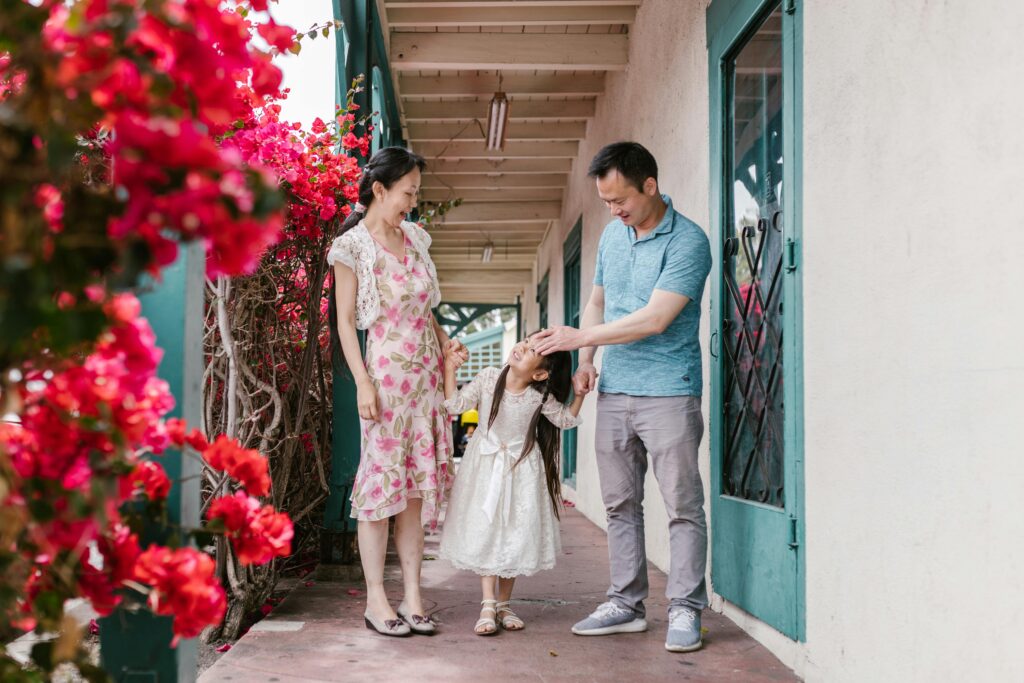"There's no universal playbook for parenting—just what works best for your family."

Parenting is never one-size-fits-all because every child is different. What works for one family might not suit another, which is why understanding parenting styles is important.
Beyond popular parenting terms like “tiger parents” or “elephant parents” there are two distinct styles often discussed: helicopter parenting and free-range parenting. Helicopter parents are highly involved, often stepping in to solve problems or prevent mistakes, while free-range parents encourage independence and allow their kids to navigate the world with less supervision.
Though these methods are opposites, both methods focus on helping children grow into confident and capable individuals. But how do you decide which approach—or combination—works best for you? Read on to find out.
1. Helicopter Parenting Signs

Feelings of Anxiety
Many parents feel anxious due to worries about the economy, job market, or general safety of the world. These concerns can lead parents to become more involved in their child’s life, wanting to protect them from potential harm or disappointment. This increased anxiety can result in a more controlling approach as parents try to create a secure environment for their children.
The desire to shield children from every possible challenge comes from a place of care, but it often leads to parents being overly involved in their child’s daily life. This level of concern can cause parents to oversee activities and decisions that the child could manage on their own.
Helping Your Child in Social Interactions
Helicopter parents often step in to manage their child’s social problems, such as conflicts with peers, teachers, or other authority figures. This involvement can include speaking directly to the adults involved or finding solutions to disputes on the child’s behalf. Parents may feel that dealing with these issues themselves is the best way to support their child’s well-being and success in social situations.
Organising Everything
Helicopter parents often take control of tasks that children could manage on their own, like organising their rooms, folding their clothes, or even completing school assignments. This behaviour usually comes from a desire to keep everything orderly and ensure things run smoothly. Some parents may go even further by contacting teachers to request better grades or even completing assignments for their children to meet deadlines.
Compensating for Past Experiences
Parents who felt neglected, unloved, or unsupported during their own childhoods may overcompensate by being highly attentive and involved with their children. This approach is often driven by a desire to provide what they missed out on during their own upbringing. It can show up as excessive monitoring, over-scheduling activities, or being constantly available to ensure their child is comfortable and happy.
While the motivation behind overcompensation is rooted in wanting to make up for past experiences, it can lead to a more involved and controlling parenting style. This often means parents feel the need to be present at all times and manage even the smallest aspects of their child’s life to prevent any negative outcomes.
Comparisons with Other Parents’ Approaches
Parents can be influenced by the actions of others, especially when they notice other parents being highly involved in their children’s lives. Seeing other parents’ constant attention and control can create pressure to match their level of involvement.
The desire to fit in or not be perceived as less committed can push parents to adopt what they view as a more involved approach. This pressure can shift a parent’s natural instincts towards helicopter parenting, leading them to take on more responsibility in their child’s life than they might otherwise choose.
2. Free-Range Parenting Signs

Giving Children Space to Explore
Free-range parents often give their children the chance to explore independently, whether it’s walking to school, playing in the neighbourhood, or spending time at a park with friends. The goal is to help children build confidence and learn to navigate their surroundings on their own.
These moments are seen as crucial for a child’s development, allowing them to gain the skills needed to deal with real-life situations as they grow. Free-range parents believe that true independence is cultivated through experiences that don’t come with constant parental oversight.
Building Practical Skills
A key aspect of free-range parenting is giving children the freedom to make their own choices, even when those choices don’t lead to ideal outcomes. This could include decisions such as choosing their own school projects, deciding what activities to participate in after school, or choosing which sport or hobby to pursue. By allowing these small choices, children learn to take ownership of their preferences and actions.
When parents make every decision for their child, it can lead to dependency on parental guidance. Free-range parenting encourages children to trust their own judgment, which builds confidence and helps them develop the skills needed to manage more significant decisions as they grow.
Allowing Children to Make Their Own Decisions
A key aspect of free-range parenting is giving children the freedom to make their own choices, even when those choices don’t lead to ideal outcomes. This could include decisions such as choosing their own school projects, deciding what activities to participate in after school, or choosing which sport or hobby to pursue. By allowing these small choices, children learn to take ownership of their preferences and actions.
When parents make every decision for their child, it can lead to dependency on parental guidance. Free-range parenting encourages children to trust their own judgment, which builds confidence and helps them develop the skills needed to manage more significant decisions as they grow.
Encouraging Unstructured Playtime
Children often have packed schedules filled with organised activities, leaving little time for free play. Free-range parents make an effort to give their children time to play without any set plans. This unstructured time lets kids choose how they want to play, encouraging independent thinking and creativity.
Free-range parents know that play is more than just fun—it’s essential for healthy development. Through unstructured play, children learn to solve problems, build social skills, and use their imaginations in ways that organised activities can’t always provide. This helps them grow self-confidence and a genuine sense of curiosity.
Letting Children Experience Failure
Free-range parenting values the importance of allowing children to make mistakes and learn from them. This approach recognises that real growth and learning often come from experiencing failure firsthand. When children have the freedom to make their own decisions and face the results, they build resilience and essential problem-solving skills.
Making mistakes helps children develop confidence in their ability to handle challenges. Free-range parents view these mistakes as valuable learning opportunities that help kids adapt, learn, and improve.
3. Pros and Cons of each Parenting Style

Helicopter Parenting Pros and Cons
Helicopter parenting has its advantages, particularly when it comes to addressing challenges children might face. These parents are highly involved and attentive, often stepping in to resolve issues before they escalate. This level of involvement can be beneficial for children who need extra help or reassurance, creating a sense of security that their parents are always there to support them. The prompt action taken by helicopter parents ensures potential issues are dealt with straight away, fostering an environment where children feel cared for and nurtured.
The commitment helicopter parents show can create a structured and supportive environment. They often take a proactive approach, making plans to help their children succeed, especially when academic or personal issues arise. This approach can help children feel confident in their ability to face challenges, knowing their parents are there to help them through difficult times. Such a strong support system can be reassuring and contribute positively to a child’s growth and development.
However, helicopter parenting can also have notable downsides. When parents over-impose their authority and intervene too often, children may feel as though they have little control over their own lives. Constant oversight can prevent them from developing the independence and confidence needed to solve problems on their own. The high expectations helicopter parents often set can lead to anxiety and self-criticism. Children pushed to meet strict standards may become overly focused on avoiding mistakes, fearing they will disappoint their parents. This can hinder their ability to build resilience and may impact their long-term emotional well-being.
Free-Range Parenting Pros and Cons
A major benefit of free-range parenting is that it encourages children to develop strong problem-solving skills. When parents step back and let their children face challenges on their own, kids gain valuable experience in overcoming obstacles and finding solutions. This helps them build a sense of mastery and self-reliance, boosting their confidence in their ability to handle future difficulties. Instead of waiting for an adult to intervene, children learn to assess situations, think critically, and come up with strategies to manage problems independently.
Another advantage is that free-range parenting allows children to explore the world without constant supervision, fostering confidence and autonomy. This independence helps children trust their own abilities and develop resilience. By making their own decisions, they learn to express their opinions and form a stronger sense of self.
Free-range parenting does come with challenges. One key concern is that unsupervised time can lead to increased risks, as children may encounter situations where they could get hurt or make poor choices. Although parents may see these moments as important learning opportunities, the potential for harm can be hard to accept. Additionally, free-range parents may face criticism from others who view their approach as too permissive or risky. This external judgment can create pressure and make parents question their choices. Despite these challenges, many free-range parents remain committed to nurturing independence and confidence, believing the long-term benefits outweigh the potential drawbacks.
Parents always want to give their children the best start in life, supporting and guiding them as they grow. However, in trying to protect them from negative emotions and experiences, parents can sometimes forget to prepare them for life’s challenges. The key is to adapt your parenting style to suit your child’s needs, as different situations may need different approaches. There’s no need to stick to one method only; combining elements from different styles can help children learn resilience and independence while still feeling supported and safe.
Check out our article: Are You a Tiger Parent or an Elephant Parent?



















